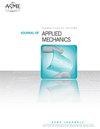电极对电活性膜动力学的影响
IF 2.8
4区 工程技术
Q2 MECHANICS
引用次数: 0
摘要
由于电活性膜的广泛应用,其动力学特性得到了广泛的研究。然而,柔性电极的机械行为的影响需要解决。本文介绍了考虑电极惯性的电驱动膜的非线性分析。膜被建模为一种超弹性材料,并被假设为不可压缩、均匀和各向同性。对压缩阶段和悬浮阶段提出了广义的分析方法。由于膜容易发生拉入失稳,因此定义了防止机电失稳的条件。进一步建立了击穿电压的解析关系,并用实验数据进行了验证。以椭圆积分的形式,采用广义的多尺度法,给出了两相轴向振动的解析解。通过图形结果描述了在一般初始条件下悬浮和压缩阶段所产生的运动及其各种物理方面,以理解所提出的分析。此外,参数值被定量分析,系统在给定的配置中执行相反的行为。本文章由计算机程序翻译,如有差异,请以英文原文为准。
Effect of electrode on the dynamics of electroactive membrane
The dynamics of the electroactive membranes are being studied extensively due to their vast application at the current time. However, the effect of the mechanical behavior of the compliant electrode needs to be addressed. This paper presents the non-linear analysis of an electrically actuated membrane, considering the inertia of the electrode. The membrane is modeled as a hyperelastic material and is assumed to be incompressible, homogeneous, and isotropic. The proposed analysis is discussed in a generalized way for both the compression and suspension phases. Since the membrane is vulnerable to pull-in instability, the conditions to prevent electromechanical instability are defined. Further, an analytical relation is established for breakdown voltage and is validated with experimental data. The analytical solution of axial vibration is presented in the form of elliptic integrals and by the use of multiple scale method in a generalised way for both the phases. The resultant motions and their various physical aspects under suspension and compression phases for general initial conditions are described through graphical results to comprehend the proposed analysis. Also, parameter values are quantified analytically, for which the system executes reverse behaviour in a given configuration.
求助全文
通过发布文献求助,成功后即可免费获取论文全文。
去求助
来源期刊
CiteScore
4.80
自引率
3.80%
发文量
95
审稿时长
5.8 months
期刊介绍:
All areas of theoretical and applied mechanics including, but not limited to: Aerodynamics; Aeroelasticity; Biomechanics; Boundary layers; Composite materials; Computational mechanics; Constitutive modeling of materials; Dynamics; Elasticity; Experimental mechanics; Flow and fracture; Heat transport in fluid flows; Hydraulics; Impact; Internal flow; Mechanical properties of materials; Mechanics of shocks; Micromechanics; Nanomechanics; Plasticity; Stress analysis; Structures; Thermodynamics of materials and in flowing fluids; Thermo-mechanics; Turbulence; Vibration; Wave propagation

 求助内容:
求助内容: 应助结果提醒方式:
应助结果提醒方式:


